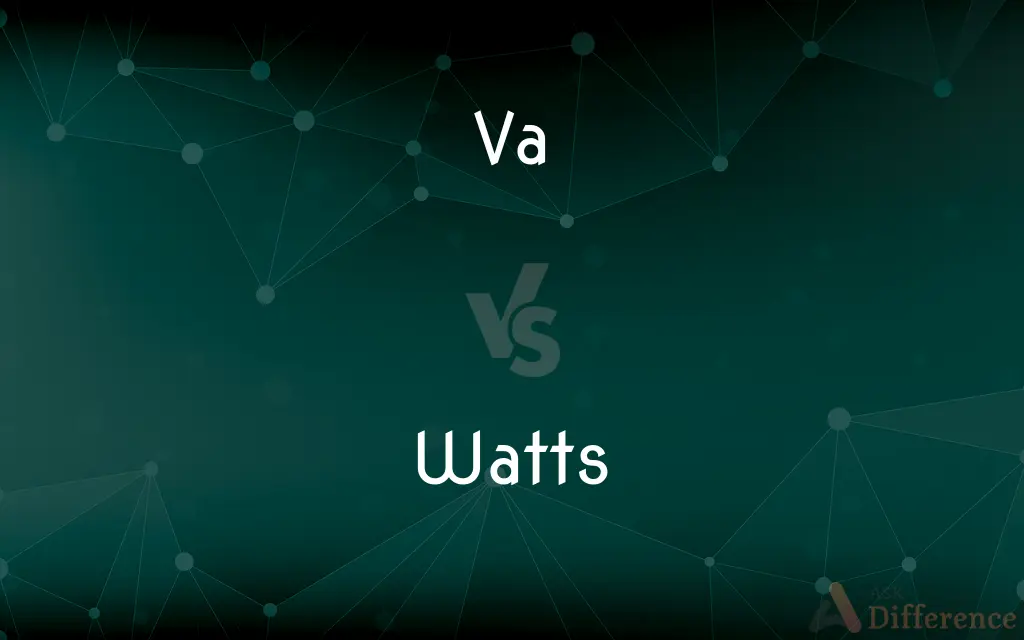VA vs. Watts — What's the Difference?
By Maham Liaqat & Urooj Arif — Updated on April 18, 2024
VA (Volt-Amperes) represents apparent power in electrical systems, while watts denote real power, the actual usable energy.

Difference Between VA and Watts
Table of Contents
ADVERTISEMENT
Key Differences
VA is a measure of electrical power called apparent power, which is used to describe the total amount of power used by a circuit. Watts, on the other hand, measure the real power, which is the power that actually performs work or generates heat within the circuit.
The difference between VA and watts arises due to the presence of reactive power in AC circuits, which does not perform any work. VA accounts for both real and reactive power, whereas watts only account for the real power that can be utilized.
VA is calculated by multiplying the voltage and current without considering the phase angle between them. Conversely, watts take into account the phase angle, representing the efficiency of power usage.
In practical terms, electrical appliances are often rated in VA to ensure that the wiring and circuitry handle the entire power flow, including any inefficiencies due to phase differences. Watts, however, indicate how much power the device converts into useful work.
Understanding the relationship between VA and watts is crucial in scenarios involving power management and electrical efficiency, where equipment must be sized appropriately to handle the apparent power while also ensuring sufficient real power is provided.
ADVERTISEMENT
Comparison Chart
Definition
Total electrical power used (apparent power)
Actual power that performs work (real power)
Calculation
Voltage × Current
Voltage × Current × Power Factor
Accounts for
Both real and reactive power
Only real power
Use in Circuits
Indicates total power flow
Indicates efficiency and actual usage
Practical Relevance
Used for sizing of wiring and total load capacity
Used for calculating actual energy consumption
Compare with Definitions
Va
A unit of apparent power in an electrical circuit, representing the product of volts and amperes.
The transformer's capacity is often given in VA to indicate its total power handling capability.
Watts
Indicates the actual power consumption of devices.
Knowing the watts is essential for understanding how much energy the device uses.
Va
Important for calculating electrical load in AC circuits.
He checked the VA rating to ensure the circuit could handle the new equipment.
Watts
A unit of real power in an electrical system, measuring actual energy output.
The appliance uses 200 watts, meaning it converts that much power into light and heat.
Va
Does not factor in phase angle between current and voltage.
Even though the device consumes 1000 VA, the actual power used might be less.
Watts
Lower watts than VA indicates presence of reactive power.
If the watts are significantly lower than the VA, the device likely has a poor power factor.
Va
Higher VA can indicate more wastage due to inefficiency.
A higher VA rating means more power is being drawn but not necessarily used effectively.
Watts
Directly relates to energy costs.
Energy bills are calculated based on watts consumed, reflecting the real energy use.
Va
Used for sizing of generators and UPS systems.
The UPS needs to have a VA rating higher than the total load to be effective.
Watts
Calculated by multiplying voltage, current, and power factor.
The real power in watts is lower than the apparent power in VA due to the phase difference.
Va
A state in the eastern United States; one of the original 13 colonies; one of the Confederate States in the American Civil War
Watts
Plural of watt
Va
The United States federal department responsible for the interests of military veterans; created in 1989
Watts
English poet and theologian (1674-1748)
Common Curiosities
What is VA used for in electrical systems?
VA is used to describe the total power flow in an electrical system, accounting for both real and reactive power.
Can an appliance have higher VA than watts?
Yes, appliances can have a higher VA than watts if they have a significant amount of reactive power.
How does power factor affect the relationship between VA and watts?
Power factor, representing the phase difference between voltage and current, affects how much of the apparent power (VA) is converted into real power (watts).
What indicates a good power factor?
A power factor close to 1 indicates a good power factor, meaning most of the power is being efficiently converted into usable work.
How can one improve the power factor in an electrical circuit?
Improving power factor can be achieved by using capacitors or power factor correction devices to reduce the amount of reactive power.
What tools are used to measure VA and watts?
Power meters and multimeters can measure both VA and watts, though some are specialized for one or the other.
Are VA and watts influenced by AC or DC power?
VA and watts concepts apply primarily to AC power due to the phase difference considerations; DC power only considers watts since there is no reactive power.
Why are watts considered when calculating energy costs?
Watts measure the actual energy consumed and therefore directly impact energy billing.
What happens if you ignore the VA rating in an electrical setup?
Ignoring the VA rating can lead to undersizing of electrical infrastructure, potentially causing overloads and failures.
Do all devices have both a VA and watt rating?
Not all devices explicitly list both ratings; some may only provide one depending on their primary function or design.
Why do UPS systems use VA for ratings instead of watts?
UPS systems use VA ratings to account for both the real and reactive power they need to support.
How does an incorrect VA or watt calculation impact electrical safety?
Incorrect calculations can lead to inadequate system design, risking overloads and potential electrical fires.
Which is more critical for home appliances, VA or watts?
Watts are generally more critical for understanding energy use and cost, while VA is important for overall system capacity and safety.
Is it possible for watts to be higher than VA?
No, watts cannot be higher than VA because VA represents the total power, including any non-working reactive power.
How do VA and watts relate to energy efficiency?
Higher watts in relation to VA indicate higher energy efficiency, as more of the power is being effectively utilized.
Share Your Discovery

Previous Comparison
Angel vs. Archangel
Next Comparison
Androgenic vs. AnabolicAuthor Spotlight
Written by
Maham LiaqatCo-written by
Urooj ArifUrooj is a skilled content writer at Ask Difference, known for her exceptional ability to simplify complex topics into engaging and informative content. With a passion for research and a flair for clear, concise writing, she consistently delivers articles that resonate with our diverse audience.














































